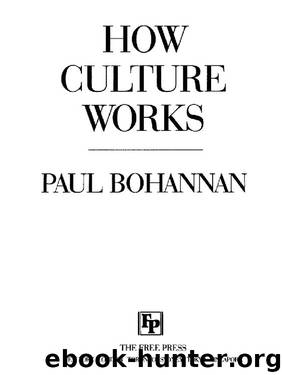How Culture Works by Paul Bohannan

Author:Paul Bohannan [Bohannan, Paul]
Language: eng
Format: epub
Tags: SOC035000
Publisher: Free Press
Published: 2010-05-19T18:30:00+00:00
CULTURAL CUSPS
Over time, small changes stack up. Two things can happen—two kinds of cusp. One is historical or evolutionary; the other is perceptual.
If many small changes lead to conditions that make it impossible to return to an earlier adjustment, an evolutionary change has occurred—cultural evolution is determined far less by what is added than by what is lost.
Perceptual change is more subtle but no less important. Although some people obviously realize, at some level, that change is occurring, they may not make a specific point of it or even adjust their activities to it. People probably won’t change their lives bit by bit, in sync with the changes around them. Rather, they do their changing in spurts, as they realize that something is wrong that used to be right. When the cumulative change becomes massive enough, people realize—perhaps suddenly—that their situation has become very different and that old ways are gone. Old ways seem to be irrelevant—they may even be unintelligible. Almost never do people understand the processes by which that difference has been brought about. They are likely, rather, to ascribe the newly realized difference to a specific event.
Here I am calling the first kind of change evolutionary change. The second can be called paradigm change. The criterion for the first is that you cannot go back to earlier cultural adjustments; the criterion for the second is that people amalgamate all the changes into a few big events—sometimes a single event—and see a paradigm shift. Seldom do they try to understand the process. Figure 9-4 shows how paradigm changes work.
Cultural Evolution. The idea of evolution is an ancient one—Greek philosophers thought about it; Latin poets wrote about it. It is a simple idea: every social or technological situation allows certain possible choices, and hence changes. Forces always gather both to encourage and to prevent changes. However, if and when those forces of conservatism are overcome and a change actually occurs, the results of the change alter the possibilities. Options that were possible earlier may no longer be available; new options are opened up for the first time.
The ideas of cultural evolution were, when they were first mooted, not in the least threatening to anybody—and by and large they still are not. However, a huge controversy erupted when the old idea of evolution was recontexted into biology, where it contradicted entrenched religious dogma. The idea of biological evolution forced a new look at accepted answers to eternal questions. Even in the present day, some people still refuse to accept the idea of evolution applied to biology even though those same people do not question the idea when it is applied to culture.
Evolution requires an input of new information into a genetic or cultural pool. Just as important, it requires a way for the system to get rid of genetic information or cultural traditions. The processes by which evolution proceeds are of course the very processes by which culture change occurs—with one additional factor. An evolutionary step is defined by a
Download
This site does not store any files on its server. We only index and link to content provided by other sites. Please contact the content providers to delete copyright contents if any and email us, we'll remove relevant links or contents immediately.
| Anthropology | Archaeology |
| Philosophy | Politics & Government |
| Social Sciences | Sociology |
| Women's Studies |
Nudge - Improving Decisions about Health, Wealth, and Happiness by Thaler Sunstein(7706)
The Fire Next Time by James Baldwin(5441)
iGen by Jean M. Twenge(5414)
Adulting by Kelly Williams Brown(4574)
The Sports Rules Book by Human Kinetics(4385)
The Hacking of the American Mind by Robert H. Lustig(4381)
The Ethical Slut by Janet W. Hardy(4251)
Captivate by Vanessa Van Edwards(3839)
Mummy Knew by Lisa James(3691)
In a Sunburned Country by Bill Bryson(3541)
The Worm at the Core by Sheldon Solomon(3486)
Ants Among Elephants by Sujatha Gidla(3467)
The 48 laws of power by Robert Greene & Joost Elffers(3291)
Suicide: A Study in Sociology by Emile Durkheim(3022)
The Slow Fix: Solve Problems, Work Smarter, and Live Better In a World Addicted to Speed by Carl Honore(3009)
The Tipping Point by Malcolm Gladwell(2920)
Humans of New York by Brandon Stanton(2873)
Get What's Yours for Medicare: Maximize Your Coverage, Minimize Your Costs by Philip Moeller(2727)
Handbook of Forensic Sociology and Psychology by Stephen J. Morewitz & Mark L. Goldstein(2704)
